Upholstery Cleaning and fireproofing – Are you compliant?

In the UK, fireproofing upholstery is governed by several key regulations, primarily aimed at ensuring that furniture is safe and minimizes the risk of fire. The main legislation that covers this is the Furniture and Furnishings (Fire) (Safety) Regulations 1988, which has been updated over the years to reflect safety standards. Here are the key requirements:
1. Flammability Standards for Upholstered Furniture:
Upholstered furniture, including sofas, armchairs, mattresses, and cushions, must meet specific fire safety standards. This includes the following:
- Covering fabrics: Must be resistant to ignition from a small open flame.
- Filling materials: Must be fire-resistant, particularly for materials like foam and fillings used in cushions and mattresses.
- Testing: Furniture must pass specific flammability tests. The regulations include a range of tests to ensure that fabrics and fillings will not easily catch fire when exposed to common ignition sources like cigarettes, matches, or a naked flame.
2. The Key Fire Safety Tests:
- Cigarette resistance test: Fabric and filling materials must withstand smoldering from a lit cigarette.
- Match resistance test: For materials used in seating, it is also necessary for them to withstand a match flame.
- Resistance to open flames: Some furniture items are subject to tests using a larger open flame to check their overall flammability.
3. Labeling Requirements:
Upholstered furniture must have a permanent label indicating that it complies with the fire safety standards. This includes information about the material and whether it meets the fireproofing regulations.
4. Regulations on Second-Hand Furniture:
If you’re selling or renting out second-hand upholstered furniture, it must also comply with these fire safety regulations. Even if the furniture is not new, it must meet the same standards for fire safety before it can be resold or rented out.
5. Exceptions:
Some types of furniture may be exempt from certain aspects of the regulations, such as antique or second-hand furniture that has been reupholstered in compliance with the standards. However, these exceptions are generally limited.
Would you like more information on the specific flammability tests or how to ensure compliance for a particular type of upholstery?
